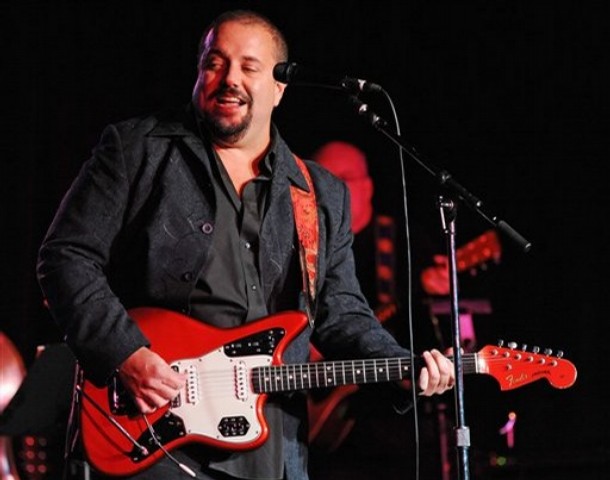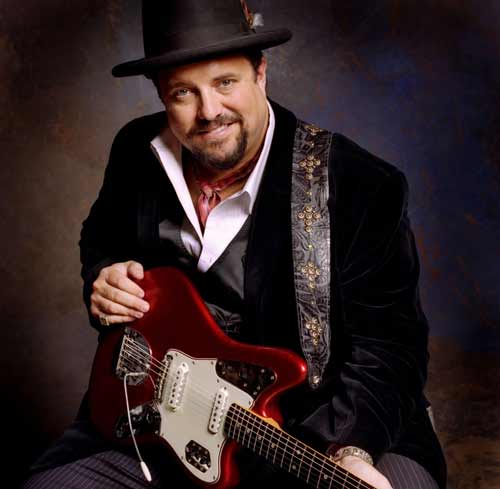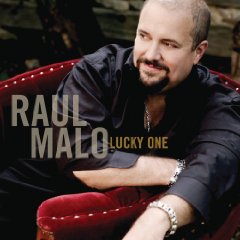FEELING 'LUCKY'
Raul Malo Gets Deep Inside A New Album Of Original Songs
By David McGee
Raul Malo: 'I will say this: Everything I do musically comes from an honest place' (Photo by Ebet Roberts)Tell Raul Malo that he doesn't seem to have any bad music in him, and you'll get a laugh, a heartfelt thank you, and a word of caution: "You should hear what didn't make it on the album."
Would that we could. Lucky One, Malo's new album, and first collection of new songs in seven years, continues unabated one of the most satisfying recording careers of the past two decades, starting with his introduction to fans as the lead voice of the adventurous, edgy, country-rockin' Mavericks, to a solo career that began in earnest with 2001's Latin-leaning Today, and has continued unabated with the triumphs of 2005's Peter Asher-produced For the Lonely and 2007's After Hours, a celebrated offering of classic country covers done in a lush, romantic style hearkening back to the countrypolitan sounds fashioned Ray Charles and producer Owen Bradley.
Lucky One consolidates the strengths of all the previous recordings. Although Malo calls on his Latin heritage only once to any great degree—on the infectious, twangy, horn-infused "Moonlight Kiss"—he doesn't skimp on the country rockers or the beautiful ballads. "Lucky One" opens the album on a galloping, dramatic note; "Something Tells Me" is the first of two songs that summon the suspensful drama of a Roy Orbison epic; "Hello Again" recalls the Mavericks' most glorious uptempo charges; "Lonely Hearts" has the twang and driving Bakersfield pulse that might entice a Dwight Yoakam cover down the road; "Rosalie," all dark and exotic in a cinematic way (thanks to some evocative fills on melodica by Dane Bryant) is a full-on, open-hearted operatic pleading to an absent lover; the closing tune, "So Beautiful," is a guaranteed swoon-inducing, piano-based love ballad sung at the end of an affair. Seven of the tracks feature Malo with minimal support—on "So Beautiful" he plays guitars, keyboard, and bass, with his vocal supported by an uncredited string section; at other times he's backed by various combinations of Jay Weaver on bass and Omnichord, John McTigue on drums and percussion; and the aforementioned Dane Bryant on keyboards—and on the others producer Steve Berlin adds seamless backdrops in the form of horns and vocals. One of of Lucky One's many impressive aspects is that the seven tracks featuring Malo alone or in a small combo setting were recorded in the singer's home studio as demos for the final album—three of the demos were so good that they're on the album intact—but the Berlin-steered tracks sound as if they came from the same sessions, testimony to the producer's innate musical integrity, which has been on display for a long time and is hardly surprising. When Malo says he trusts Berlin's instinct "as much as I trust anybody's," he's speaking from experience—the two teamed up on the Today album (after having me on sessions for a Los Super Sevens album), and it worked out pretty well.
"I love the way Steve works," Malo says. "I like his adventurous attitude, you know, 'Let's try to some stuff, and if it doesn't work, we have a laugh. No big deal.' I really enjoy working like that and he's got a good bullshit meter. He doesn't let you stray too far from the beaten path, put too much on it. He has impeccable taste, I gotta say."
In fact, Malo admits that his instinct in the studio is to "put all the bells and whistles on it," but it was Berlin who insisted the sparse home demos be used on the album, without any further polishing or sweetening. "Steve was a real proponent of keeping the demos on the record because he liked the vibe, he thought they sounded great, and he really convinced me. I gotta say, looking back on it, it was the right move."
In terms of making the right move, Malo confesses that he's arrived at a point in his career where he considers what he wants personally over what might be the commercially savvy approach. As celebrated a vocalist as he is, his albums have hardly topped the sales charts. But he's a solid box office draw, and gains new fans each time out, which translates into a loyal and growing following for his work and a manic response to his live displays of vocal prowess, which are truly one of the natural wonders of thjs world. He says he's "lucky.
"Everything is so based on how well an album does commercially. But I've never had to worry about that because I don't ever do well commercially. So I have a little bit more freedom, I guess, to really do what I want. If as an artist you really fulfill what's in your heart and what's inside of you and you really follow that, then hopefully other people will like it. So far I've been lucky in that other people have liked my stuff."
'If as an artist you really fulfill what's in your heart and what's inside of you and you really follow that, then hopefully other people will like it. So far I've been lucky in that other people have liked my stuff.'It's easy—almost impossible not to—get lost in the beauty of Malo's voice, in the drama he injects into his lyrics, and get swept up in the emotional tide of his productions. What Lucky One does is refocus attention on his songwriting, the most overlooked aspect of his art. Digging into the content he offers here, some themes emerge, principally those of loving and losing. How he expresses those ideas, or eventualities, is where it gets interesting. Despite the strong, upbeat and witty start of "Lucky One" and "Moonlight Kiss," the album goes five songs deep with songs addressing uncertainties in a relationship, to the point where, in "Lucky One" and "Moonlight Kiss," he even employs gambling references in speaking of a romance, to wit, "let the chips fal where they may" and "go ahead, roll the dice," respectively. In "Ready For My Lovin'," he talks about a love blooming "if by chance we stay together"; in "Hello Again," he sings, "Here's to what might have been." The album hurtles to its finish with a clutch of songs (save for "One More Angel," which is a story unto itself) that express not uncertainty about a relationship but the absolute certainty that it's over. Even the dreamy "So Beautiful," clearly meant to close things out on a romantic note, includes the lyric, "now we're both believers in leaving all behind." Throughout the journey, however, the music is unfailingly evocative, moving, absorbing, even beautiful, and certainly full of energy when that's required.
So in the midst of all this beauty, Mr. Malo, why such fatalism?
He begs to differ.
"I don't really see it that way. 'Lucky One' is an upbeat one. I don't know that that's really fatalistic. If anything, in "Lucky One" he's found his love. 'Moonlight Kiss' is just kind of a silly, fun song, not to be taken too seriously, not that anyone will. It's more of that vibe, you know, like the song "Something Stupid"—"saying something stupid/like I love you," like it got away from me a little bit. 'So Beautiful,' I don't view as fatalistic. I kinda see that one really more as optimistic; I see that one as, 'Hey, things change and it's okay for things to change.' It was inspired when I was sitting out on my back terrace. It had rained and it was one of those days when the news was just awful everywhere you turned, it was just god awful. And I couldn't take it anymore, so I turned off the TV and went outside, where there was a beautiful morning shower, So I brought out the pen and paper, as I was sitting there watching the rain wash away all the topsoil and all the junk from the garden. And then, after about an hour of this, the sun came out and the garden was absolutely beautiful. I thought, Maybe I'll use that as a concept for this song, in that change is okay, but we're always so resistant to it. We talk about change, but we're really resistant to change, we don't really like change much. I'm talking about just as a species, and as a culture. We talk about embracing it, but it's just a lot of talk. We don't really change much. But in this day and age I really think we have to change, we have to change our ways—the way we recycle, the way we live, the way we heat our home, finance our lives, the way we bank. Everything has to change because the way we've been doing it for the last hundred years is really wrong, and it's destroying the planet and really destroying a lot of lives. There's a lot of turmoil in the air, a lot of uncertainty. But I think all that is necessary to get to the next level. So that's the inspiration for that song, and that's why I don't view it as fatalistic, but more as ending the record on a cautiously optimistic note. Granted, it's not the feel-good movie of the year, no doubt, but that's the point. I think it's a bit more of a pragmatic approach.
"As far as the other ones, I will agree that there is certainly that element."
That being the name of that tune, we move on to the heart of the album, wherein lies three songs that seem overt homages to artists who have had a profound influence on Malo the singer: "Ready For My Lovin'" is all swagger and R&B grind, and the vocal recalls Elvis's epic treatment of James Taylor's "Steamroller Blues"-listen closely in the headphones as the song fades out and you'll hear Malo doing an Elvis blues drawl, in fact. The slow, string-enhanced, vividly recreated heartbreak of "Crying For You" is pure Orbison, except for the "Send In the Clowns" guitar fills throughout; and the easygoing, guitar-fueled shuffle and breezy pop lilt of "You Always Win" comes from the Les Paul-Mary Ford school of classic American post-war pop.
"Right on the mark," Malo says of these assessments. "Most people have mentioned 'You Always Win' with Dean Martin or Frank Sinatra, and you know what? It is a tribute to all that. Because I grew up listening to all that. And to me it was all music. It was all part of my childhood and it's in me. And I don't really care any more if it sounds like this or sounds like that. Everything sounds like something. If it's gonna sound like something, it might as well sound like people I want to sound like. So I don't really care about the comparisons, really. The criteria for me is just writing a good song, regardless of what genre or era it seems to be from, or what the lineage is. The lineage is through me, no matter what, because I make the music. It's my work. So it's gonna go through me no matter what. All that stuff is in me, it's part of me, part of what I uphold as some of the greatest music and some of the greatest entertainers we've ever seen and heard. You're spot-on on all those comparisons, because 'Ready for My Lovin'' was my attempt to write a blues song. I'm not a blues artist. I grew up in Miami! I didn't have Route 66; I had the Arthur Godfrey Causeway and McArthur Causeway and Collins Avenue and all that. So it's kind of a blues mixed in with a little bit of Miami in there."
And that "Send In the Clowns" quote?
"That's what you would call a sus, a suspension," he says. "It stays on the four while everyone else stays on the one. That's an old musical trick. It's not only 'Send In the Clowns,' believe me. It's 'Can't Take My Eyes Off Of You,' 'My Way,' 'Suspicious Minds.' The list goes on and on. It's just a musical vocabulary, fun thing."
'Everybody wants to be remembered in a nice way; no one wants to be remembered as being a shit.'One song that's neither homage nor heartbreaker is the sturdy, anthemic "One More Angel." At the end of its first verse it reveals itself to be addressed to someone who's died. The music, all forcefully strummed electric guitar and slamming drums, with various percussion devices such as cowbell adding color, proceeds with dignity and solemnity, but not without a bracing energy, a positive spirit enhanced by Malo's buoyant, impassioned reading. It turns out to be inspired not by a single death but rather by multiple tragedies. And the concatenation of events evoked in Malo thoughts on the fundamental questions about our daily conduct.
Malo: "'One More Angel' was originally inspired by the death of a friend of mine's young daughter. She was out one night and was killed by another driver, in a car accident. So he lost his daughter. Almost immediately after that horrible event, a friend of a friend passed away, and then my wife's aunt passed away. So all these people that were close to me or I knew of were gone, and the song took on a whole other dimension in that as I was writing it I thought, You know, instead of making it about one specific event, let's make it about how we conduct ourselves when we're here, about what we leave behind when we're gone. How did we affect people? Did we love our kids enough? Did we tell our friends that we loved them enough? Did we hug our parents enough? And what will they say about us when we're gone? At the end of the song that's the turn—what will they say about you when you're gone? Will they say, 'One more angel is up there,' and all that? So in the end it becomes more about us and how we deal with life and how we're perceived when we're gone. Which I guess is an important thing, your legacy and what you leave behind. You know I have kids, and everybody wants to be remembered in a nice way; no one wants to be remembered as being a shit."
Whatever its themes, whatever anyone hears in it, Lucky One finds Malo not only in good form, but sounding free, strong and confident in his artistry. These things are difficult to judge, but it could be argued that he's never sounded so at ease on record before, never performed with such assurance or personal commitment to the material. He's about as deep inside his songs as he could get.
"You know I will say this: it does come from an honest place, whether people like it or not," he says. "That's certainly up for debate, and you're never gonna please everybody. But everything I do musically does come from an honest place. Whenever it hasn't felt right, and hasn't come from an honest place, I think you can tell. At least with me. I'm a terrible liar when it comes to music. Certainly when it comes to singing things I really don't want to sing, or can't sing. I remember a couple of Maverick tracks like that that I was outvoted on and didn't feel it, and when I hear those tracks I go, 'Ohhh...' But I don't feel like I have to worry about that stuff anymore."
THE BLUEGRASS SPECIAL
Founder/Publisher/Editor: David McGee
Contributing Editors: Billy Altman, Derk Richardson
Logo Design: John Mendelsohn (www.johnmendelsohn.com)
Website Design: Kieran McGee (www.kieranmcgee.com)
Staff Photographers: Audrey Harrod (Louisville, KY; www.flickr.com/audreyharrod), Alicia Zappier (New York)
E-mail: thebluegrassspecial@gmail.com
Mailing Address: David McGee, 201 W. 85 St.—5B, New York, NY 10024
Founder/Publisher/Editor: David McGee
Contributing Editors: Billy Altman, Derk Richardson
Logo Design: John Mendelsohn (www.johnmendelsohn.com)
Website Design: Kieran McGee (www.kieranmcgee.com)
Staff Photographers: Audrey Harrod (Louisville, KY; www.flickr.com/audreyharrod), Alicia Zappier (New York)
E-mail: thebluegrassspecial@gmail.com
Mailing Address: David McGee, 201 W. 85 St.—5B, New York, NY 10024




